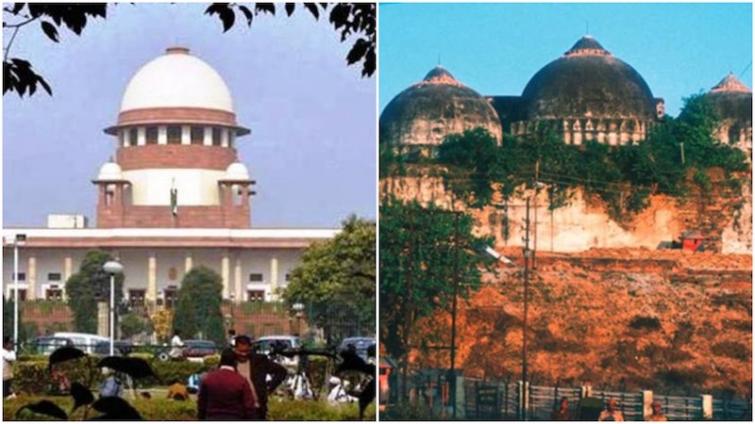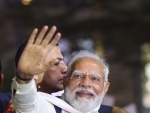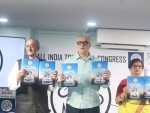
Supreme Court verdict favours Ram Temple construction in Ayodhya; Mosque in separate land
New Delhi/IBNS: In a historic judgement to a politically-sensitive Ayodhya case which has been raging for almost 70 years, the Supreme Court on Saturday paved way for the construction of Ram Temple in the disputed 2.77 acres of land in Uttar Pradesh's Ayodhya dismissing the Sunni Waqf Board's claim to the land. The apex court also directed that a mosque be built over 5 acres in a prominent location.
Amid a tightened security across the nation and particularly in Uttar Pradesh, a five-judge bench headed by Chief Justice of India (CJI) Ranjan Gogoi asked the Indian government to set up a trust within three months to decide on the disputed Ayodhya land for the Hindus to build a temple, while they asked for a five-acre land for the Muslims to construct a mosque in a prominent alternative location.
Inner and outer land should be given to the trust, the court said in the 70-year-old legal dispute. In a unanimous judgement, the Sunni Waqf Board was given 5 acres of alternate land.
The disputed land now goes effectively in possession of the Indian government.
The court said the judgement is based on the basis of Constitution and the Archaeological Survey of India (ASI) and not on based of faith. The court rejected the demolition of the disputed structure or the Babri Masjid in 1992. The court also rejected the event of 1949 when Hindu activists had surreptitiously placed idols of Lord Rama inside the mosque.
The apex court said the Muslim parties have not been able to exhibit possessory claim to inner courtyard while the Hindus were able to prove unimpeded possession of the outer courtyard.
Existence of structure before mosque can't alone be basis of title claim, the top court said.
On Archaeological Survey of India report, the apex court said, "Adequate material in ASI reports conclude the mosque was not built on vacant land, Babri was built on underlying structure which was not Islamic structure."
Insight into the case
The hearing of the case is second-longest in the history of Independent India, after the Keshvananda Bharti case continued for 68 days.
In 2010, Allahabad High Court, in its verdict had divided the disputed 2.77 acres of disputed land in Ayodhya equally among Ram Lala, the Nirmohi Akhra and Sunni Waqf Board.
The case went to the apex court after pleas were filed challenging the high court verdict.
Hindus argued was that the Lord Ram was born exactly where Babri Masjid was built—demolished by the karsevaks in Dec 1992. They also claimed that the place has a special significance for the Hindus.
The Muslim side argued that they had executive title over the land and sought restoration of property of what it is was prior to Dec 1992.
Reactions
Hailing the Supreme Court's judgement, Prime Minister Narendra Modi, who belongs to the Bharatiya Janata Party (BJP) which had included the construction of Ram Temple in its poll manifesto, said the judgement strengthens confidence of common man in judiciary.
He tweeted in reaction: "This decision of the Supreme Court is important for several reasons: It shows how important it is to follow the legal process in resolving a dispute. Each side was given enough time and opportunity to present its arguments. The temple of justice resolved the decades-old case amicably."
सà¥à¤ªà¥à¤°à¥€à¤® कोरà¥à¤Ÿ का यह फैसला कई वजहों से महतà¥à¤µà¤ªà¥‚रà¥à¤£ है:
— Narendra Modi (@narendramodi) November 9, 2019
यह बताता है कि किसी विवाद को सà¥à¤²à¤à¤¾à¤¨à¥‡ में कानूनी पà¥à¤°à¤•à¥à¤°à¤¿à¤¯à¤¾ का पालन कितना अहम है।
हर पकà¥à¤· को अपनी-अपनी दलील रखने के लिठपरà¥à¤¯à¤¾à¤ªà¥à¤¤ समय और अवसर दिया गया।
नà¥à¤¯à¤¾à¤¯ के मंदिर ने दशकों पà¥à¤°à¤¾à¤¨à¥‡ मामले का सौहारà¥à¤¦à¤ªà¥‚रà¥à¤£ तरीके से समाधान कर दिया।
"This decision will further strengthen the confidence of the common man in judicial processes. In accordance with the spirit of brotherhood of thousands of years of our country, we have to introduce peace and restraint to 130 crore Indians. To introduce the underlying spirit of India's peaceful co-existence," he said.
Welcoming the verdict, Union Home Minister and BJP national president, Amit Shah, tweeted, "I believe the historic judgement passed by the Supreme Court will prove to be the cause of unity in the country. The verdict will strengthen unity and culture of the country."
मà¥à¤à¥‡ पूरà¥à¤£ विशà¥à¤µà¤¾à¤¸ है कि सरà¥à¤µà¥‹à¤šà¥à¤š नà¥à¤¯à¤¾à¤¯à¤¾à¤²à¤¯ दà¥à¤µà¤¾à¤°à¤¾ दिया गया यह à¤à¤¤à¤¿à¤¹à¤¾à¤¸à¤¿à¤• निरà¥à¤£à¤¯ अपने आप में à¤à¤• मील का पतà¥à¤¥à¤° साबित होगा। यह निरà¥à¤£à¤¯ à¤à¤¾à¤°à¤¤ की à¤à¤•à¤¤à¤¾, अखंडता और महान संसà¥à¤•à¥ƒà¤¤à¤¿ को और बल पà¥à¤°à¤¦à¤¾à¤¨ करेगा।
— Amit Shah (@AmitShah) November 9, 2019
In its one of the first reactions, Congress, the country's main opposition party, has put up a tweet which reads, "Today the Supreme Court's judgement has respected the faith & trust of the people. Congress President Smt. Sonia Gandhi during the Congress Working Committee meeting passed the resolution on the matter of Ayodhya & construction of Ram Mandir."
Today the Supreme Court's judgement has respected the faith & trust of the people. Congress President Smt. Sonia Gandhi during the Congress Working Committee meeting passed the resolution on the matter of Ayodhya & construction of Ram Mandir.
— Congress Live (@INCIndiaLive) November 9, 2019
Uttar Pradesh Chief Minister Yogi Adityanath tweeted, "I welcome the verdict of the Supreme Court. The Uttar Pradesh government is committed to maintaining the peace and harmony in the state."
माननीय सरà¥à¤µà¥‹à¤šà¥à¤š नà¥à¤¯à¤¾à¤¯à¤¾à¤²à¤¯ के निरà¥à¤£à¤¯ का सà¥à¤µà¤¾à¤—त है, देश की à¤à¤•à¤¤à¤¾ व सदà¥à¤à¤¾à¤µ बनाठरखने में सà¤à¥€ सहयोग करें, उतà¥à¤¤à¤° पà¥à¤°à¤¦à¥‡à¤¶ में शांति, सà¥à¤°à¤•à¥à¤·à¤¾ और सदà¥à¤à¤¾à¤µ का वातावरण बनाठरखने के लिठउतà¥à¤¤à¤° पà¥à¤°à¤¦à¥‡à¤¶ सरकार पूरà¥à¤£ रूप से पà¥à¤°à¤¤à¤¿à¤¬à¤¦à¥à¤§ है।
— Yogi Adityanath (@myogiadityanath) November 9, 2019
AIMPLB not satisfied with the verdict
The All India Muslim Personal Law Board (AIMPLB) said it is not satisfied with the Supreme Court's verdict.
Addressing a press conference, Sunni Waqaf Board counsel Zafaryab Jilani said, "We are dissatisfied with the the verdict and findings of the Supreme Court. We are not satisfied with the judgement. It is not as per our expectations. We will explore legal remedies later."
"I urge all to maintain peace. The verdict is not about anyone's win or loss. No protest will take place, he said.
RSS welcomes verdict
Addressing a press conference, the chief of BJP's parental organisation Rashtriya Swayamsevak Sangh (RSS), Mohan Bhagwat, said, "We accept the verdict of the Supreme Court. Now all the fight and quarrels must end."
Support Our Journalism
We cannot do without you.. your contribution supports unbiased journalism
IBNS is not driven by any ism- not wokeism, not racism, not skewed secularism, not hyper right-wing or left liberal ideals, nor by any hardline religious beliefs or hyper nationalism. We want to serve you good old objective news, as they are. We do not judge or preach. We let people decide for themselves. We only try to present factual and well-sourced news.







